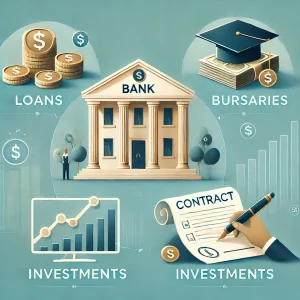Overview of Loans, Bursaries, Investments, Banking

Overview of Loans, Bursaries, Investments, Banking
Welcome to NGFinders – Your Ultimate Finance Guide
Overview of Loans, Bursaries, Investments, Banking
At NGFinders, we are committed to helping you navigate the complex world of loans, bursaries, investments, and banking. Whether you’re looking for financial assistance, seeking the best investment opportunities, or trying to find the right banking solutions, we provide in-depth insights, comparisons, and expert guidance. Our goal is to help individuals and businesses make smart financial decisions that lead to financial freedom and stability.
Loans – Finding the Best Loan for Your Needs
Loans are essential financial tools that provide individuals and businesses with access to funds when needed. At NGFinders, we help you compare and choose the right loan based on your financial situation. Below are some of the most common loan types:
1. Personal Loans
Personal loans are unsecured loans that can be used for various purposes, including medical expenses, home renovations, and debt consolidation. They typically have fixed interest rates and repayment terms. Key factors to consider when choosing a personal loan:
- Interest rates and fees
- Loan term and repayment schedule
- Credit score requirements
2. Business Loans
Starting or expanding a business often requires financial support. Business loans provide funding for small and large enterprises. Some of the common types include:
- Startup Loans – For new businesses looking to launch operations.
- Working Capital Loans – Short-term loans to manage daily business expenses.
- Equipment Financing – Loans specifically for purchasing business equipment.
3. Student Loans
Education is an investment, and student loans help cover tuition fees, accommodation, and other academic expenses. Depending on your location, you may have access to:
- Federal student loans (government-backed with lower interest rates).
- Private student loans (offered by banks and credit unions).
4. Mortgage Loans
Buying a home is a significant financial decision, and mortgage loans provide the necessary funding for homeownership. The two main types are:
- Fixed-rate mortgages – Consistent interest rates throughout the loan term.
- Variable-rate mortgages – Interest rates fluctuate based on market conditions.
Car Loans
Overview of Loans, Bursaries, Investments, Banking
Bursaries – Unlocking Educational Opportunities
Higher education can be expensive, but bursaries provide financial relief to deserving students. Unlike loans, bursaries do not require repayment, making them an excellent option for students in need.
Types of Bursaries
- Merit-Based Bursaries – Awarded to students with outstanding academic performance.
- Need-Based Bursaries – For students from low-income families.
- Sports and Talent-Based Bursaries – Awarded to students excelling in sports or arts.
- Corporate and Government Bursaries – Offered by companies and government agencies to support education in specific fields.
How to Apply for Bursaries
- Research available bursaries in your country.
- Prepare academic records and financial proof.
- Write a compelling application and submit before the deadline.
- Follow up with the bursary provider if necessary.
For students seeking funding, NGFinders provides up-to-date lists of bursaries available in different countries. Check out our bursary section to find opportunities that match your academic and financial needs.
Investments – Growing Your Wealth Wisely
Investing is a great way to grow your wealth over time. Whether you’re a beginner or an experienced investor, making the right investment choices is crucial for financial security.
Common Investment Options
- Stock Market – Buying shares in companies can provide long-term financial growth.
- Real Estate – Investing in property can generate rental income and appreciate in value.
- Cryptocurrency & Forex – Digital assets like Bitcoin and foreign currency trading can be high-risk but offer high rewards.
- Mutual Funds & ETFs – Managed funds that pool money from multiple investors for diversified investments.
Investment Strategies for Beginners
- Start small and diversify your investments.
- Understand risk tolerance and financial goals.
- Stay informed about market trends and economic conditions.
- Consider working with a financial advisor for expert guidance.
At NGFinders, we provide comprehensive guides and expert insights into various investment options to help you make informed financial decisions.
Banking – Choosing the Right Bank for Your Needs
Banking is the foundation of financial management, and selecting the right bank can significantly impact your financial health. Banks offer various services, including savings accounts, loans, credit cards, and investment solutions.
Factors to Consider When Choosing a Bank
- Interest Rates on Savings & Loans – Compare interest rates to maximize savings and minimize borrowing costs.
- Banking Fees – Be aware of hidden fees such as maintenance and transaction charges.
- Digital Banking Services – Many banks now offer online and mobile banking for easy access.
- Customer Support – Choose a bank with reliable customer service.
Types of Banking Services
- Retail Banking – Personal accounts, savings, and credit services for individuals.
- Business Banking – Services tailored for businesses, including loans and merchant accounts.
- Digital & Mobile Banking – Online banking apps that allow seamless financial transactions.
- Investment Banking – Specialized financial services for large corporations and investors.
Final Thoughts – Your Path to Financial Success
At NGFinders, our mission is to empower you with the knowledge and resources to make informed financial decisions. Whether you’re looking for a loan, a bursary, an investment opportunity, or the best banking options, our platform provides the latest information, expert insights, and helpful tools to guide you.
Why Choose NGFinders?




Overview of Loans, Bursaries, Investments, Banking
Explore More:



